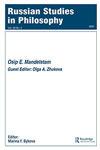Soviet and Post-Soviet Generations of Russian Philosophers: Framing the Problem
IF 0.1
4区 哲学
Q4 Arts and Humanities
引用次数: 0
Abstract
ABSTRACT This article proposes a generational approach to the study of the formation of the philosophical tradition. A philosophical generation is a powerful intellectual pattern with its own optics, sets of problems, and methods of research. The author distinguishes six generations of philosophers living and working in Russia today. The specific nature of each philosophical generation is determined by its existential contribution to the philosophy of those close to each other in terms of their experience of discipleship and integration into formal and informal philosophical institutions, and by the commonality of their intellectual foundations. In the case of philosophical generations, this refers not only to the age of those “doing philosophy” but also to the emergence of a new attitude toward philosophy itself, to the production or mastery of new ideas and meanings, to new trends in the discussion of already familiar issues and phenomena, to a new social and cultural role for philosophy, to new general understanding of the world and of man, to a change in what is called “the philosophical way of life.” Studying philosophical generations is important for restoring the human context of philosophical development. The path of cognition from generational type to texts is no less important than the usual path from texts. Reading the history of philosophy as the history of generations of philosophy focuses scholars’ attention on personal connections within the philosophical community (both horizontal and vertical), which clarifies both the individual contribution of thinkers and the mutual influences that determine the birth and development of philosophical ideas.苏联和后苏联时代的俄罗斯哲学家:问题的框架
本文提出了一种代际方法来研究哲学传统的形成。哲学一代是一个强大的智力模式,有自己的视角、问题集和研究方法。作者区分了今天在俄罗斯生活和工作的六代哲学家。每一代哲学的特殊性是由其对那些彼此接近的人的哲学的存在主义贡献决定的,就他们的门徒经历和融入正式和非正式的哲学机构而言,以及他们的智力基础的共性。哲学的一代,这不仅指那些“哲学”的时代也出现新的态度哲学本身,生产或掌握新理念和含义,对新趋势的讨论已经熟悉的问题和现象,为哲学,一个新的社会和文化角色,新的人,一般对世界的理解和改变所谓的“哲学的生活方式”。研究哲学代际对于恢复哲学发展的人文语境具有重要意义。从代际类型到文本的认知路径与通常从文本到文本的认知路径一样重要。将哲学史解读为几代哲学史,将学者的注意力集中在哲学共同体(横向和纵向)内的个人联系上,这既澄清了思想家的个人贡献,也澄清了决定哲学思想诞生和发展的相互影响。
本文章由计算机程序翻译,如有差异,请以英文原文为准。
求助全文
约1分钟内获得全文
求助全文
来源期刊

RUSSIAN STUDIES IN PHILOSOPHY
PHILOSOPHY-
CiteScore
0.10
自引率
0.00%
发文量
14
期刊介绍:
Russian Studies in Philosophy publishes thematic issues featuring selected scholarly papers from conferences and joint research projects as well as from the leading Russian-language journals in philosophy. Thematic coverage ranges over significant theoretical topics as well as topics in the history of philosophy, both European and Russian, including issues focused on institutions, schools, and figures such as Bakhtin, Fedorov, Leontev, Losev, Rozanov, Solovev, and Zinovev.
 求助内容:
求助内容: 应助结果提醒方式:
应助结果提醒方式:


